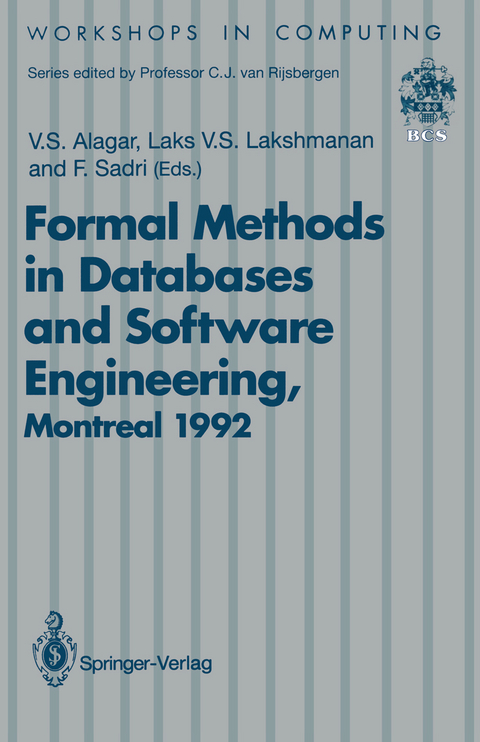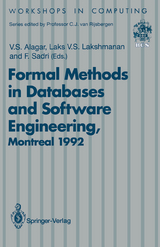Formal Methods in Databases and Software Engineering
Proceedings of the Workshop on Formal Methods in Databases and Software Engineering, Montreal, Canada, 15–16 May 1992
Seiten
1993
|
1. Softcover reprint of the original 1st ed. 1993
Springer Berlin (Verlag)
978-3-540-19812-3 (ISBN)
Springer Berlin (Verlag)
978-3-540-19812-3 (ISBN)
Logic and object-orientation have come to be recognized as being among the most powerful paradigms for modeling information systems. The term "information systems" is used here in a very general context to denote database systems, software development systems, knowledge base systems, proof support systems, distributed systems and reactive systems. One of the most vigorously researched topics common to all information systems is "formal modeling". An elegant high-level abstraction applicable to both application domain and system domain concepts will always lead to a system design from "outside in"; that is, the aggregation of ideas is around real-life objects about which the system is to be designed. Formal methods yhen applied with this view in mind, especially during early stages of system development, can lead to a formal reasoning on the intended properties, thus revealing system flaws that might otherwise be discovered much later. Logic in different styles and semantics is being used to model databases and their transactions; it is also used to specify concurrent, distributed, real-time, and reactive systems. ,The notion of "object" is central to the modeling of object oriented databases, as well as object-oriented design and programs in software engineering. Both database and software engineering communities have undoubtedly made important contributions to formalisms based on logic and objects. It is worthwhile bringing together the ideas developed by the two communities in isolation, and focusing on integrating their common strengths.
Transaction Logic: An (Early) Exposé.- Aggregate Operations in the Information Source Tracking Method.- An Incremental Concept Formation Approach for Learning from Databases.- The Tecton Proof System.- Modeling Time in Information Systems.- A Unified Framework for Database Specification: Functional Approach.- Using VDM Within an Object-Oriented Framework.- Software Engineering Environments - What Do We Want?.- Efficient Deduction and Induction: Key to the Success of Data-Intensive Knowledge-Base Systems.- On Querying Temporal Deductive Databases.- Intuitionistic Interpretation of Deductive Databases with Incomplete Information.- Author Index.
| Erscheint lt. Verlag | 24.2.1993 |
|---|---|
| Reihe/Serie | Workshops in Computing |
| Zusatzinfo | VII, 193 p. |
| Verlagsort | London |
| Sprache | englisch |
| Maße | 155 x 235 mm |
| Gewicht | 320 g |
| Themenwelt | Mathematik / Informatik ► Informatik ► Datenbanken |
| Mathematik / Informatik ► Informatik ► Netzwerke | |
| Informatik ► Software Entwicklung ► Objektorientierung | |
| Mathematik / Informatik ► Informatik ► Theorie / Studium | |
| Schlagworte | Database • Databases • Data Mining • deductive database • Development • formal • formal methods • Incomplete Information • information system • Knowledge recovery • Logic • Modeling • object • programming • Software • Software engineering • Specifications • theorem proving • Transaction logic • verification |
| ISBN-10 | 3-540-19812-1 / 3540198121 |
| ISBN-13 | 978-3-540-19812-3 / 9783540198123 |
| Zustand | Neuware |
| Haben Sie eine Frage zum Produkt? |
Mehr entdecken
aus dem Bereich
aus dem Bereich
objektorientierte Entwicklung modularer Maschinen für die digitale …
Buch | Hardcover (2024)
Hanser (Verlag)
44,99 €
Entwicklung von GUIs für verschiedene Betriebssysteme
Buch (2023)
Hanser, Carl (Verlag)
39,99 €
Principles and Practice Using C++
Buch | Softcover (2024)
Addison Wesley (Verlag)
85,95 €




